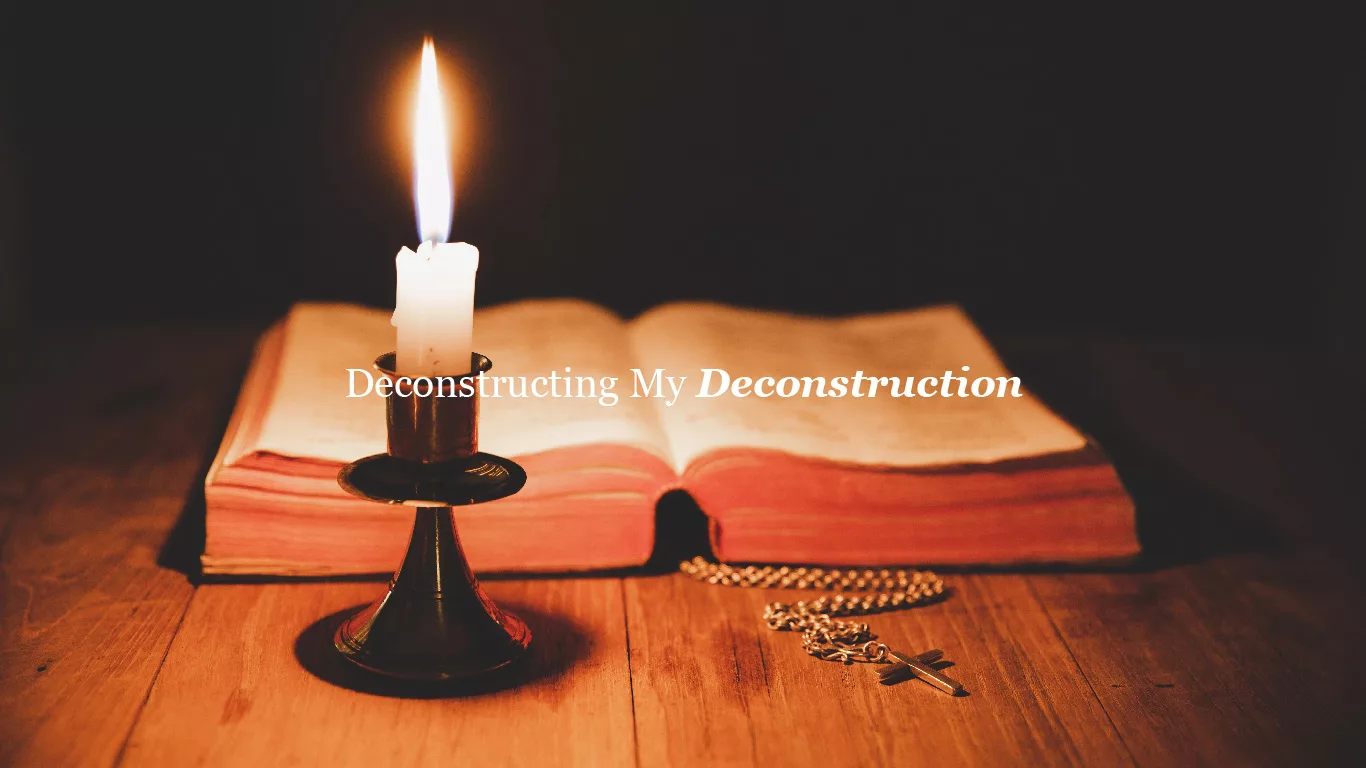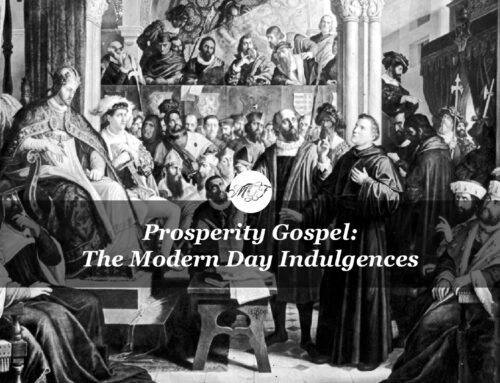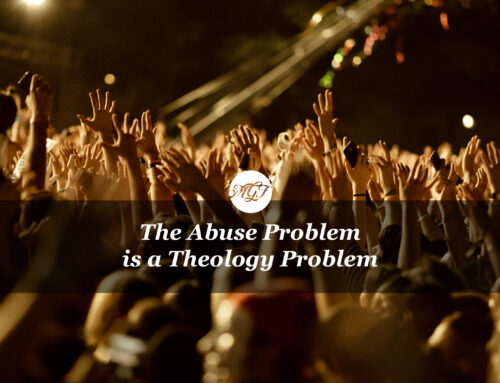I began writing this article in February 2023.
Scratch that. I began wrestling with the content of this post in January 2020, but I hadn’t been able to articulate it until now. Even so, you can see that it’s January 2024 and I’m just now posting it.
There are reasons for that, too, which I will get into later. I haven’t really shared my story. I’ve held a lot back and there are lot of reasons for that. But it’s time. 2023 brought for me and my family some huge changes — from walking away from our church denomination of over two decades to an entire career change, it was a banner year for reasons I could never have anticipated. Those changes were both welcome and terrible. And the path to get there has been marked with beautiful wounds and terrible scars, lessons and tears and hope and finally peace. It’s time to share my story.
Bear in mind that this is going to take a while to get through. You might want to grab a snack.
The Seeds of Change
I miss pews. I miss stained glass. I miss hymnals and candles and the smell of the narthex on a Sunday morning. I’ve been missing those things in church for a long time. And for a long time, I chalked all of that up to nostalgia. For the same reasons we all want Christmas morning to feel like it did when we were kids, I figured I probably just missed all of those things because I was feeling nostalgic. It wasn’t until I really began to explore the why behind those feelings that I realized it was more than nostalgia on my part. I’m a creative person who can appreciate the value of just about any iteration of a given thing — in other words, I don’t pigeon-hole my expectations for most things, because I can appreciate the heart and artistry behind something new and shiny just as much as I can behind something old and dilapidated.
I remember the first time I walked into a church that felt new and shiny. In the massive lobby (not narthex), were banners advertising the music artist visiting us. She was selling albums and t-shirts and merch and it was all so marvelously designed and creatively displayed that it felt important. I felt important for being there. And I felt like I was on the cutting edge of the Church 2.0. I was in my twenties, and I had fallen desperately in love with the modern church movement — namely the lights and fog and loud music and edginess that made it feel fresh and so very not my grandmother’s church. It felt like we were doing something. Moving the marker forward. Making our own mark, thank you very much. I even had a t-shirt in college that said Jesus is Not a Religion. My God, I was so edgy. (*sarcasm*)
All of that glitz and glamour satiated my young, eager heart long enough for me to get so steeped in it that I couldn’t see the proverbial forest for the trees for many, many years. But all along my journey through the love affair with the modern Church‡, there was this quiet whisper in my soul. This subtle nagging. It told me something wasn’t right.
But ignored it for years.
I ignored it until I could no longer.
‡Please note: I intentionally capitalize the word Church in specific uses throughout this article. In a nutshell, if it’s capitalized, I’m referring to the greater Western Church, not just one particular gathering.
The Dark Night of the Soul
I began what I now understand to be my deconstruction phase somewhere around the fall of 2017. I had just miscarried a surrogate baby and broken from that entire experience, I felt myself slipping into a very dark place. A natural outcome, I suppose, but it was one of the darkest times of my life.
On top of that, I was working in a job that I did not realize at the time was one of the most unreasonable and toxic environments of my professional experience. But I thought it was my dream job. I told myself it was my dream job. It was a job for Jesus, after all. But the pressure of that role was insurmountable in a way I could not see while I was in the middle of it. Like a classically abused person, I just assumed the problem was me. I wasn’t enough. I wasn’t trying hard enough. I wasn’t giving enough of myself.
So I gave more and more and more. I gave and gave and ignored the fact that I was sacrificing precious time and years with my family while my babies were young in the name of the greater good, whatever that is.
I’m sure you’re wondering why I’m being vague. The truth is, I have no desire to drag any names or entities through the mud. I do not believe anything that happened was the result of malicious people with sinister intentions. Quite the contrary, actually. I believe that what happened was the result of a system we have built in this country where the Church herself is married in a toxic relationship to capitalism, progress, and corporate principles. I am just one of many casualties along the conveyor belt of that system.
This is my story.
Burnout
By early 2020, I was so burned out from my church job I could hardly carry on a conversation. By the time the pandemic was in full swing, I had a full-on panic attack. The kind where you think you’re having a heart attack. I had never once in my life experienced even a mild panic attack and I had no idea what was happening to me. But the pressure I was under at work thanks to the pandemic and the problems it brought meant that I had reached my breaking point. I knew my job was not sustainable but I was terrified to leave it.
There were several reasons for that. For one, it was in the Church. Failing at a job in the Church felt like failing Jesus himself. Second, I was still telling myself it was my dream job. Never mind I had been at it for over five years and never once gotten a raise. Never mind I was constantly reprimanded for problems that were out of my control and rarely (I’m talking I can count on one hand the times I was) commended. I had a thousand plates spinning at once and no one cared. They just wanted more.
More of me. More of my time. More of my brain. My creativity. What I brought to the table. More. Always more.
I was part of that system for years. I helped foster it. I thought it was the new way forward. The Western Church has become solely dependent on what I would call marketing gimmicks. Giveaways. Games. Social events. Crazy sermon series titles just to offend people. And merchandise. So. Much. Merchandise. T-shirts, caps, water bottles, stickers, jewelry, bags, journals, vests, buttons, and more. What I once loved, I now cringe when I think about because while I know all of that is created and sold out of a heart to reach as many people as possible, it took me a while to see that all it did was attract the kind of people that don’t want to dig in, grow, disciple, and grow more into the church. It only attracts the kind of people who want to be entertained. And at some point, inevitably they will stop being entertained.
I know I did.
During this time, I worked as a marketing director for a church. I tried to use my voice to offer as much alternate perspective as I could. I’m no expert — that’s not what I mean. But as I could not ignore that nagging voice telling me something wasn’t right, as I began to see the flaws in the Western Church’s thinking, I began to speak up more and more, offering alternative ideas and narratives.
“How about instead of advertising church events, we start telling the personal stories of people whose lives have been changed because of their faith?”
“What if we focus less on programs and more on discipleship?”
“What if we stopped taking 15 minutes of the service to market our events and worship more?”
Most of the time, I was overruled, but I told myself that I was picking up a sword in the name of growing up the church and getting us closer to something more resembling true ministry. I told myself that eventually, they’d see it too.
But more and more, with each passing year, I lost faith entirely in the system that I had been a part of fostering. I saw how it hurt people. I saw how it over-asked and under-delivered. I saw the volunteers who were overworked and essentially abused by a “we can do anything in two weeks” mentality. And more and more, the only tether keeping me there was that I felt like the only person standing between the nonsense and the people who were hurt by it. I thought I was their only defender.
(Yes, I see now the ignorance and arrogance of such thinking. But in that time of my life, it felt genuine. It was genuine. I truly wanted to make a difference. I truly tried to.)
Deconstruction Phase
By the time the summer of 2020 rolled around, every single night I took a bath once the kids were in bed and just wept. I’m talking heaving breaths, snotty, red-eyed weeping. I didn’t even really know why, either.
Except I did. I just wouldn’t admit it.
It was around this time I discovered the movements by Ola Gjeilo — Dark Night of the Soul and Luminous Night of the Soul. I must have listened to them about 10,000 times throughout that summer, weeping through every stanza. I looked up the meaning of the phrases, only to learn that the Dark Night of the Soul is a common experience–the phrase coined by the gnostics, it refers to what they consider to be an inevitable phase of the Christian walk in which the believer begins to deeply wrestle with what they’ve believed. Some will come out on the other side with a clearer picture of their faith. Some will leave their faith altogether.
In other words, deconstruction.
And I knew then that I was smack dab in the middle of mine.
That word terrified me. To the core. I was horrified by the idea of losing my faith. I was terrified of what it might look like to live life without it. But I was so close to leaving it all behind. So close to throwing in the towel, so hurt by people who I know love Jesus and mean well. So broken by a system that I know is not doing anything intentionally malicious. I could not reconcile it. I could not make sense of a Church that just can’t seem to “people.” (Forgive me for making a verb out of a noun. It’s such a millennial thing to do. But in this case, it works and I make no apologies.)
I was prepared to walk away completely. Maybe not ever go to church again. My husband was on board, as hurt as I was. So I tendered my resignation and told myself it was time to move on.
Of course, I didn’t. I was too scared to make such a move. I see now that it was absolutely the Providence and grace of God that kept us from walking away, but at the time it felt like a punishment. So goes the path of faith, I suppose.
I stayed at our church. I wrestled with my faith in a new way, no longer on full-time staff sitting at the table with those supposedly in charge, no longer with that alternative voice I had come to put all my hope in. During that time, I forced myself to take a long look at the root causes of so many of my hurts and the systemic problems that had led to them. With weary arms and exhausted motivation, I picked my sword back up and told myself I would keep fighting for what I knew was right. After all, if I didn’t, who would?
I know I’m speaking in platitudes here. I know I’m giving a 30,000 or even 50,000-foot view of what I went through. I’d rather not get into the weeds for many reasons, the main reason being to protect the people involved and even the churches in question. Once again, I have no desire to drag anyone or any entity through the mud. That’s not the point of this article. As I said before, I do not think any of the problems were from some intentionally malicious plan on the part of the leadership. I do not think anyone involved was trying to hurt people. Quite the opposite. But this system did–and still does–hurt people. By the hundreds. Nay, thousands. Probably more. It’s not confined to any one church or denomination or even phenomenon. It’s a combination of many factors, layered with all manner of motivations, and seasoned with all personality types.
For me personally, I knew that I needed to explore what happened to me and my family and what I could have done differently.
And in that exploration, I think I’ve figured something out.
The Attractional Methodology
In the modern Church, particularly in what is called the Western or Evangelical Church, we work so very hard to attract people. We come up with all manner of gimmicks to convince those on the outside to just give us a try. And I truly believe that the heart behind this way of thinking is pure. Why wouldn’t we want to get people in the door to hear the Good News, so to speak? Of course, we would! That is not what I question anymore.
I question our methodology.
In the name of accessibility, we’ve watered down our faith to little more than a social club. In the name of reach, we’ve dumbed down our services to nothing more than entertainment. In the name of meeting people where they are, we’ve created a model that looks much too much like the world we’re supposedly trying to be a refuge from. And I’ve begun to ask: why would the secular world want to go to a mediocre version of something they could get anywhere else, but with less fun and genuine connection? Why would anyone want to go to the modern church when it looks no different than a bar? Or a shopping mall? Or a corporate training seminar? Tell me, can you see the difference between most modern church buildings and modern corporate offices?
We’ve abandoned cathedrals for sleek, minimalistic rectangles. We’ve abandoned altars for fog machines. We’ve abandoned crosses for logos. We’ve abandoned hymnals for light shows and electric guitars. We’ve abandoned the Bible for a self-help message you can listen to on any daytime talk show, any given day of the week.
All in the name of reaching new people.
The great irony is that the Church is shrinking.
I suppose that’s no irony at all.
The Revolving Door
We brag about all the new people walking through the doors, completely ignoring all the others who have already walked out the back doors, burned out from our abusing them, angry at our ignoring them, and hurt at our shaming them. We tell ourselves we’re making a difference with one new program after another, naming it something clever and funneling people through it like they’re on some kind of spiritual conveyor belt. And then we call that discipleship. We baptize people by the hundreds and thousands and then send them on their merry way with zero accountability, help, or advice for what to do next. We brag about all the money we give to so-called world missions and blatantly ignore all the money we waste on nonsense initiatives. We form worship teams around the latest flash-in-the-pan band we heard on Spotify, attempting to replicate the sound with software and stems we purchased on the websites where these bands oh-so-helpfully sell their music (it’s almost as if this is planned). We marginalize anyone who’s just not quite good, trendy, or young enough to be in the band. We sell merchandise in our lobbies and tell ourselves it’s not the same thing Jesus turned over in anger when he visited the temple. Then when that merchandise is passé, we quite literally just throw it away and produce more. (I remember a time when a church I was part of decided we didn’t like a batch of t-shirts anymore, and I was told to just throw them away. Instead, and without permission, I arranged for them to go to the local mission.)
No wonder the Church is dying in the West. It’s run like a crappy, dying Fortune 500, with people at the helm who couldn’t successfully manage a 7-11. No wonder there is a growing cynicism toward the Church. She’s no longer sitting as a shining light on a hill, she’s slumming with the refuse and calling herself accessible. I’m going to get on my soapbox here, but the love of Jesus people like to throw around like a rag doll may have started with grace but it ends with a call to die with him. The love of Jesus is rooted in sacrifice — namely DYING to ourselves in order to live. If the Church is doing nothing more than standing with open arms saying come as you are, just come in the door, we’ve only gotten half of that love. Because yes, you should come as you are. But you better leave changed. You better leave who you were behind. That gets messy. There’s nothing attractive about that. There’s nothing marketable about asking people to die to who they are.
It’s a higher calling — a city on a hill that cannot be hidden. But it’s the cost of following Christ — putting down our lattes and picking up our crosses. It’s falling on our faces in awe before the Holy Maker of the Universe, not jamming out to our favorite tunes by our favorite worship leaders.
Hear me in this: Yes, I’m angry. But I’m not angry at any one person. I’m not upset at any one entity. I’m angry that Satan has so clearly infiltrated the ranks with this nonsense mentality and so few are saying a damned word about it.
Yes, I’m angry.
The moment I realized all of this, the moment I was able to articulate it in any meaningful way, was the first moment that I was able to lay aside the existential fear I had been carrying of losing my faith. I’m not losing my faith. I believe in God. I love Jesus wholeheartedly. I believe He is the way, the truth, and the life and that no man comes to the Father except through him. I believe that without question. I’ve seen too much to question whether he is good, whether he exists, or whether he is the answer. He is. There is not a shred of doubt in my mind.
I just don’t believe in the Western Church anymore.
Let me be more specific: I don’t believe in any church model that is centered around entertainment and marketing strategies.
I still work in marketing, just not for the Church anymore. I know that world like the back of my hand. I know how cutthroat it is. How rooted it is in finding the next new thing. Please hear me clearly: there is NO PLACE for capitalistic marketing strategies in the Church. None. Jesus does not need to be marketed, he needs to be known.
Return to the Basics
I started wearing a rosary lately. I’m not Catholic. I’ve never been Catholic. I don’t believe in most Catholic theology. But what they have that my church experience has abandoned almost completely is reverence. Awe. Wonder. Tradition. So I bought a rosary and wear it daily. (My husband laughs at me because, as a former Catholic, he loves to point out that no true Catholic would actually wear a rosary.) I don’t wear it in mockery. I don’t wear it as a fashion accessory. I wear it to remind myself that Jesus transcends this modern-age nonsense. I wear it to remind myself that my faith tradition has outlived worse and it will outlive this, too. And I wear it to remind myself that I still have a sword, it’s just not the one I thought I had. It’s not a sword of better ideas, it’s the sword of the Spirit.
I won’t fight for the modern Church anymore. I won’t keep trying to stop it from steering off course. I’m not sure it will ever return to its first love. And I believe this methodology will die with the rest of the nonsense offshoots of our faith that have bloomed like weeds and died off over the centuries.
But I will never stop fighting for my faith. I will never stop fighting for the name of Jesus. And I will never stop hoping for the Church. The True Church.
So finally I can articulate my story: my deconstruction was not from my faith. My deconstruction was from how we church in America today (there I am again, making a noun into a verb). Not all of the churches in America. Not by a long shot. But sufficient to say: my love affair with the modern Evangelical movement has died. I’m not leaving the Church. I’m not crossing my arms, stomping my feet, and crying foul. Instead, I’m returning to my roots. Returning to candles and scripture readings and reverence and respect. I’m returning to hymns and spiritual songs; to sermons that marinate in the Word instead of sprinkling in a few highlights from time to time. To hats and dress shoes on Easter Sunday morning. I’m returning to cathedrals and chapels and wonder and take off your sandals for the place where you are standing is holy ground. I’m returning to liturgy and ritual and tradition. I’m picking up my old hymnal and really learning the meaning of those songs. I’m getting back to the heart of true worship and the meaning of true faith. No frills. No gimmicks. No marketing tactics.
I don’t know what it will look like yet. I don’t know what it will do for my family, but I know — I’m talking deep down in my soul know that if I don’t, I’ll hand my children a cheap, gimmick imitation of faith — a Jesus country club. In other words, I’ll hand them a lie.
I can’t do that. I can no longer take that risk. We don’t have that luxury anymore.
For the first time in a very long time, I have peace.














